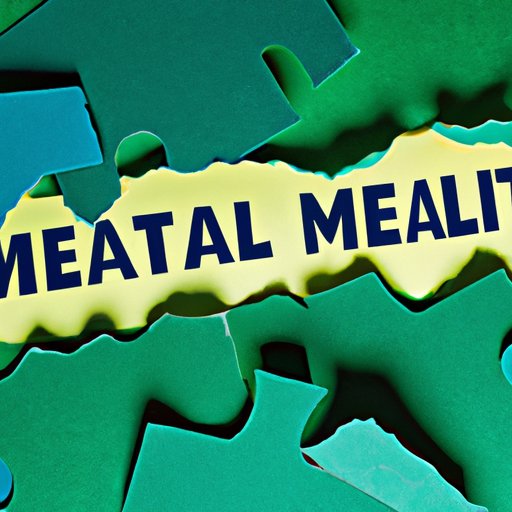
Introduction
Mental illnesses are a growing concern in today’s society, affecting millions of people worldwide. Those who suffer from mental illnesses require proper diagnosis and treatment to lead healthy and fulfilling lives. However, who diagnoses mental illnesses, and the accuracy of these diagnoses continues to be a subject of debate. Understanding the different approaches to diagnosing mental illnesses is critical in ensuring that individuals receive proper mental health care.
Explaining the Role of Mental Health Professionals in Diagnosing Mental Illnesses
Various mental health professionals specialize in diagnosing and treating mental illnesses. Among these professionals, psychiatrists are medical doctors who specialize in mental health care. They are authorized to prescribe medication and provide psychotherapy to their patients. On the other hand, psychologists are not medical doctors but hold doctoral degrees in psychology, which qualifies them to provide psychotherapy and other healthcare services to their patients. Therapists, including licensed clinical social workers, marriage and family therapists, and counselors, provide psychotherapy and other support services to individuals struggling with mental health concerns. Depending on the severity and complexity of the mental health condition, patients may receive care from one or more mental health professionals, working together to provide optimal treatments.
Historical Overview of Diagnosing Mental Illnesses
Historically, mental health diagnoses were highly stigmatized and often considered an individual’s personal failure or weakness. Several misconceptions and stereotypes surrounded mental illnesses. For example, during the Middle Ages, people with mental health problems were often considered possessed by demons or witches. Subsequently, they were subject to purging, trepanning, and other unproven and cruel treatments to cure their conditions. The rise of psychology and psychiatry helped change the way mental illnesses were perceived. The Diagnostic and Statistical Manual of Mental Disorders (DSM-5) and other contemporary approaches help reduce the stigma surrounding mental illnesses.
The DSM-V and Mental Illness Diagnosis
The DSM-V is a diagnostic tool used by healthcare professionals to identify mental health conditions. The DSM is a comprehensive manual that classifies and quantifies symptoms, rating their intensity, and suggesting appropriate treatments. The DSM benefits from continuous updates to maximize its reliability and validity in diagnosing mental health conditions. The DSM-5 is the most recent and comprehensive version of the DSM. It contains new information about psychiatric illnesses’ biological, environmental, and social bases and new classifications of disorders. The DSM-V is an essential tool for mental health professionals worldwide, guiding them as they diagnose and treat mental illnesses.
Understanding the Criteria for Mental Illness Diagnosis
Mental health professionals employ various criteria when diagnosing mental illnesses. The DSM-V is one standard that guides healthcare professionals. Mental health professionals diagnose many mental health conditions based on a person’s persistent feelings, thoughts, or behavior changes in response to an external trigger or spontaneously. The professional considers a variety of triggers that can lead to mental health concerns, such as a recent traumatic event. Mental health professionals encounter a variety of symptoms and behaviors that may indicate mental illness, including extreme mood swings, recurring hallucinations, and suicidal thoughts or behaviors. In addition, healthcare professionals need to consider the longevity of symptoms and their impact on a person’s ability to function and lead an active and meaningful life.
Alternative Approaches to Diagnosing Mental Illnesses
Several alternative approaches focus on diagnosing mental illnesses outside the traditional DSM diagnostic process. Holistic approaches, such as naturopathic medicine, Chinese medicine, and Ayurveda medicine, take a more holistic approach and incorporate unconventional techniques such as acupuncture, yoga, and nutritional therapy. These treatments empower clients to take an active role in their healing process. Another approach is the use of other diagnostic tools besides the DSM. One such diagnostic tool is the Structured Clinical Interview for DSM-5 Disorders, which helps mental health professionals identify significant mental health concerns quickly.
The Family Physician’s Role in Diagnosing Mental Illnesses
Family physicians are often the first healthcare professionals that patients turn to when they are experiencing health concerns, including mental health issues. As such, family physicians have an important role in identifying mental illnesses in their patients. They employ a variety of screening tools, including patient health questionnaires, psychiatric diagnostic screening questionnaires, and depression and anxiety screeners, to identify patients with mental health concerns. In particular, family physicians need to be mindful of changes in a patient’s behavior or mood, which may indicate underlying mental health concerns. When necessary, family physicians refer patients to licensed mental health professionals who specialize in mental health care.
Debating the Role of Self-Diagnosis in Mental Illness
Self-diagnosing is a prevalent trend in the digital age, according to a recent study published in the Journal of Medical Internet Research. The study revealed that up to 35% of internet users often seek out information to self-diagnose. Despite the potential benefits, such as greater personal empowerment, self-diagnostics has drawbacks. For instance, the risk of making a wrong self-diagnosis or misinterpreting information can be substantial. This can lead to wasted time and resources and create unnecessary stress for the individual. In addition, when self-diagnosing, an individual may disregard the recommendation to seek professional help. As such, self-diagnosis should be approached with caution. An accurate diagnosis should be made by a licensed mental health professional whenever possible.
Conclusion
Proper diagnosis is essential in supporting individuals with mental health concerns. With the right diagnosis, mental health professionals can provide proper treatment and intervention to help individuals recover and lead fulfilling lives. Understanding who can diagnose mental illnesses and the processes followed in doing so is vital for everyone. With the various approaches available, including traditional diagnostic tools like the DSM-5, alternatives such as holistic approaches, and the role of family physicians in identifying and screening mental illness, proper care and treatment are possible.





